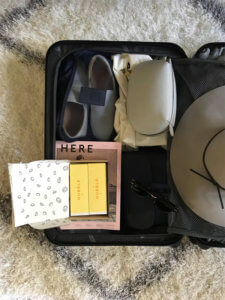Before you began your recovery journey, travel meant an opportunity to let loose. For each of us, there can be different reasons why alcohol and travel go together so well on a trip, but now that you’re away from home, for whatever reason, you’re going to have to strategize how to untangle the two.
Drinking and Travel are Culturally-tied, so Be on Your Toes
A few of the reasons why travel can be particularly challenging:
- For business trips: Going to a bar and getting a drink with colleagues or prospective clients is almost expected.
- Fun trips: Ever since “Spring Break” was a thing, partying and fun seem to fuse together. You know better now, but it doesn’t mean it won’t be a challenge. And even if you’re not up for partying…relaxing and drinking are tied together, too.
- Being alone: No one is watching. You don’t have to figure out excuses. You can just do what you want.
- Visiting families: Families are complicated. They may not know how to support you, may not want to support you because of their own issues, or may not trust that you are changing.
It’s challenging to be the person who goes against the flow of how things have been done and to speak up for something you need. You’ll have to evaluate exactly how much you want to reveal, and you’ll have to be incredibly honest with yourself about what you can handle and what you can’t.
 So How Do You Stay Sober When on a Trip?
So How Do You Stay Sober When on a Trip?
You’ve worked hard to get where you are. You’ve detoxed, learned new ways of doing things, and you’ve explored some of the painful issues behind your drinking or using. It’s important to stay vigilant. Here are a few ways to help strengthen you as you travel:
1. Strategize beforehand with your support circle
You haven’t gotten sober on your own. This isn’t something you should do on your own either. Sit down with your addictions counselor, therapist, sponsor, or support group and brainstorm what are the challenges you will specifically face and how should you deal with them.
“Design a better environment. Change will happen naturally” — James Clear
2. Support groups are everywhere. Find one.
Whatever support group system you participate in, arrange to attend a meeting the first day there if possible. It will help you keep your focus in a new environment.
3. Keep phone numbers handy.
Arrange to check in with sponsors or other support people both regularly and if you’re facing a challenge. Keeping connected can keep you centered.
4. Know what you’re going to say and what you’re going to do
You’ve already worked on this with your support system. Practice saying it. Visualize acting it out. Revisit your plan frequently.
5. Listen or read supportive materials while you’re driving or flying
Read or listen to recovery materials while you’re en route so you’re in the right mindset. Here are just a few ideas:
- 13 Brilliant Ted Talks on Addiction
- 5 Recovery Podcasts Worth Listening To
- Sandy B’s Recovery Audios (99 presentations Sandy Beach has given to AA Groups and other recovery venues)
6. Don’t underestimate a trigger
Some of the most prominent triggers intrude when you forget self-care. If you’re feeling tempted, look at how your feeling. Does it fall under the HALT categories (Hungry, Angry, Lonely, Tired)? Identify what you’re feeling and take care of the real need.
Anticipate where some of those triggers might show up. For instance, if your hotel has a minibar in your room, call ahead and have it emptied before you check in. What other situations could come up that you can prevent?
7. Structure your time
Set up a routine so that you stay active and get your needs met. Schedule time to eat, exercise, and practice any self-care such as journaling, meditation, etc.
Keep as much of your normal routine as you can so that you have a sense of normal. This will help with returning home, too.
Don’t leave huge blocks of time empty–rest is good, but too much downtime invites loneliness or boredom. Find your balance.
8. Know that family dynamics are hard
Changing the way you and your family relate to each other takes time. Even if they wanted you to go into treatment, traveling with your family or going to visit family will bring up new challenges and it just takes time to adjust to new ways of relating to each other.
This is definitely a place to strategize and anticipate where you’ll find difficulties and how you’ll handle them. But oddly enough, the people you know best sometimes present the biggest surprises, so anticipate the unexpected.
 Stay Vigilant, Even on Vacation
Stay Vigilant, Even on Vacation
Relapse happens when you underestimate the possibility for temptation–when you “just want to relax and feel normal.” Trips are one of those places where we’re either so busy we’re tempted to drop our guard or we just want to relax and not work our program.
You’ve worked so hard to achieve your sobriety, but an upcoming trip is not a break from that work–it’s a new challenge that you can rise to meet. Even though you’re going away from home, you’re not alone. Rely on your support systems, strategize how you’ll deal with the challenges, and create an environment that will encourage you to stay clean and sober.
Spring Gardens Recovery in Southern Florida is Here to Help
Sometimes the trip you need to take is the one that will start your recovery. If you’re realizing that you’re not in control of your drinking or use of other substances, we’re here to help. We provide a safe environment to detox and begin your recovery.
Our treatment center is in the Tampa area where you’ll find warm breezes and a supportive environment. You can find out more about us here.


 So How Do You Stay Sober When on a Trip?
So How Do You Stay Sober When on a Trip? Stay Vigilant, Even on Vacation
Stay Vigilant, Even on Vacation